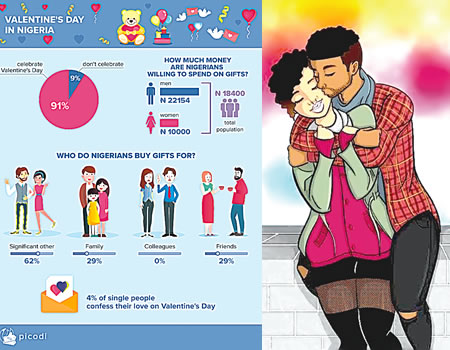In the United States, a couple may decide to visit the venue of their first date or where the proposal happened, as a way to celebrate love on Valentine’s Day. Roses, candy hearts, teddy bears and chocolates are given and taken in very good faith. It is becoming customary, in the Philippines, for people to gather en masse at malls and other public area to hold weddings or renew marital vows. While South African women pin the names of the men they love on their sleeves, an ancient Roman tradition known as Lupercalia, Italians exchange BaciPerugina – small, chocolate-coated hazelnuts wrapped with a romantic piece of writing done in four languages. There are several other Valentine traditions from around the world. But in Nigeria, there is no specific way of celebrating February 14th but whichever way people choose to do it, money is usually involved. Tangible money.
Ballot box snatchers: FEC okays Buhari’s ‘shoot-at-sight’ order
Nigerian lovers are not so much the type for roses, chocolates, cards, letters and the likes. Rather, they fancy love-ly cakes, expensive perfumes, clothing and jewelleries. Cell phones and cars are probably the most envied, because they are some of the items people place extravagant value on. As lovers (and infatuated couples) are dying to impress their partners, business outlets latch onto the borrowed culture by packaging products and services in ways that will make them reap enormous gains, while also making the fantasies of the love birds come alive. At the top of this ‘food chain’ are the markets, entertainment and food industries. The Valentine atmosphere in Nigerian cities looks like packed malls, crowded cinemas, a sharp rise in the purchase of everything from confectionery to fashion accessories and beverages. Then there are the telecommunication companies servicing demands for video calls, text messages and other things they may needed for. For those who would have to travel miles for love and those who prefer the private, vacation and honeymoon-themed kind of Valentine eve, hotels and resorts do stand by and at alert. Nigerian-American writer EnumaOkoro writes that “Valentine’s Day has become an economic gold mine” a number of businesses. So, how much do people spend for the love festival and where does the money go?
To find out the spending pattern of Nigerians during the Valentine’s Day celebrations, Mastercard Love Index may be one interesting place to check out. The annual Mastercard Love Index is a statistical data obtained from analysis of online payments, credit, debit and prepaid card transactions (from 11th to 14th February in years 2016 to 2018) made by Mastercard users. From the statistics, the biggest spenders turned out to be Africa and the Middle East. It was revealed that there has been a 107 percent increase in the number of e-commerce transactions from these two regions between 2016 and 2018. In the Middle East and Africa, a 10 percent spike was observed in love spending with the overall number of transactions going up by 20 percent. The data also suggests that lovers from these regions take time to plan for the day as majority of the purchases were made three days earlier (February 11th) whereas on the global scale, there were more last-minute shopping with the majority of purchases taking place on February 14th, the Valentine’s Day.
Globally, demand for traditional gifts like roses and bouquet increased by just 7 percent although Valentine’s Day spending on such went up by 112 percent in Africa and the Middle East while there was a global decrease for jewelry gifts in 2018 compared to 2016, which may suggest a tendency for people to use less romantic styles last year than in previous years. In Nigeria’s reality, however, people certainly prefer jewelleries to floral gifts.
On the global scale, Mastercard discovered that hotel reservations topped the list of Valentine’s Day’s spending with a 9 percent increase from 2016 to 2018 and a total spend increase of 5 percent. In Africa and the Middle East, the numbers rose by 20 percent from 2016 to 2018, with a total spend increase of 19 percent. There was also a marked growth in transactions for travel and transportation. Bringing this to Nigeria, this may be an indication that people also care for things other than material goods.
Speaking on the trend OmokehindeAdebanjo, Area Business Head, West Africa, Mastercardremarked,“In an age where contactless payments and same-day delivery ecommerce purchases are now the norm, it’s now easier than ever to impress our loved ones with meaningful Valentine’s surprises. Our data reveals that consumers across the globe are enjoying spontaneous experiences to share with their special someone, over and above material gifts and are planning ahead to make it extra special.
“The Mastercard Valentine’s Day Index – now in its fourth year – highlights key global and regional trends to uncover behavioural trends such as this shift towards on-the-day shopping, and hopefully offers retailers some priceless insight into consumer buying habits during the period leading up to the most romantic day of the year.”
In America alone, people spend more than $13 billion every year for Valentine’s Day and $403 million on the 198 million roses produced annually for the day. In Nigeria, Valentine is celebrated with much fervor and frenzy. It may not sync with any festival in the indigenous cultures but the younger generation are festooned to the celebration as they are wont to be enamoured of many Western practices and ideas. The visible part of the celebration includes the “declarations of undying love, surprise marriage proposals, over the top attempts to win affections or in some relationships dramatic romantic displays to secure forgiveness or pacify emotions” (EnumaOkoro), but are people giving gifts out of duty and compulsion rather than genuine commitment?
The Valentine period seems to be that time of the year that people suddenly remember they are in love (or infatuated) and have to do something visible to prove it. Making frantic efforts to impress and express has come to also mean outpouring of love from the heart (or what looks like that) as well as cash from the wallet. People are tempted to forget what their partners have done for before, the moment the other party fails to gift them something. Too much expectation for one day. Valentine ’s Day can be so materialistic and vain to elicit jealousy from singles. Some people go to the extent of advertising on social media to hire a temporary partner to celebrate the day with. Gifts are taken to be testaments of true love such that the failure of a person to give their partner gifts or a very special treat could rock the relationship bad. This has grave implications as the relationship may be abundant with material things but lacking in passion and true love. Some ask, shouldn’t love be celebrated every day? Valentine’s Day has been reduced to celebrating romantic love, thus precluding a generic, universal brand of love. Of other forms of love that could be celebrated on that day, the romantic has taken pre-eminence..
Valentine’s Day celebration also comes with some ironies; ironies like the high spending to service poor quality of love. Isn’t it also rather interesting that the ‘world headquarters of poverty’ has this much to spend for love?
Additional information from Mastercard and Google
Photo credit: hotels.ng, picodi.com
Cover picture: lequzhai.com







